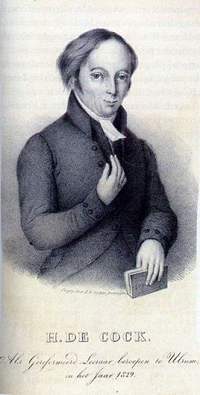Remembering the Dutch reformer, Hendrik de Cock.
 Photo: Pixabay (CC)
Photo: Pixabay (CC)
Standing up for Scripture has never been popular. The blessed Word of God is often crushed underfoot in a godless age.
The real tragedy, however, of ecclesiastical history is when Scripture is cast aside by the visible church of God. It was such a departure that led Luther to come out from Rome; Spurgeon to leave his beloved Baptist Union; Gresham Machen to abandon the Northern Presbyterian Church; and David Randall to forsake the once powerful Church of Scotland. In each case, fidelity to the Bible meant separation from apostasy.
One lesser-known example of such a division comes to us from the annals of the Dutch Reformed Church (1571), namely, the Act of Secession or Return (1834) which was promulgated more than half a century before Abraham Kuyper’s famous departure from the same State Church in 1886.
The Act of Secession had to do with one man, the preacher Hendrik de Cock (1801-42). Born into the Dutch Reformed Church, de Cock entered into the ministry after graduating from the liberal theological faculty at Groningen.
His conversion to orthodox Protestantism took place somewhere around 1829 thanks to three key factors:
- His discovery of Calvin’s Institutes (definitive edition, 1559).
- A copy of the Canons of Dort (1618-19).
- Material published by various writers associated with the awakening (Revéil) that took place in Geneva around 1810.
 Hendrik de Cock (1801-42) / Wikimedia Commons (CC)
Hendrik de Cock (1801-42) / Wikimedia Commons (CC)As can be imagined, de Cock’s embrace of a robust evangelical Christianity sparked a wholesale revolution in his preaching. His tone turned prophetic. News ran abroad of the minister’s newfound faith in the apostolic Gospel and the thousands flocked to hear him share the Word of God.
Nevertheless, such popularity was soon to land the pastor in hot water. Members of neighbouring Reformed churches began to bring their babies to be baptized under de Cock’s blessing as they were dissatisfied with the liberal tendencies within their own congregations.
What was the man of God to do? To baptize or not to baptize! Ultimately, de Cock obliged, much to the pleasure of the parents but much also to the displeasure of the ordained State Church ministers.
De Cock’s denomination stepped towards the end of 1833 in and the thirty-two-year-old reverend was kicked out of his Ulrum-based pulpit.
The Act of Secession would take some ten months to materialize. Conservative church members were infuriated when the Dutch Reformed Church forbade de Cock’s fellow evangelical cleric Hendrik Scholte (1806-68) from preaching the Word of God. They suspected the State Church was attempting to win back the congregation to the cause of liberalism.
Appealing to articles 28 and 29 of the Belgic Confession (1561), 137 church members were to sign the Act of Secession which read, “The congregation was living in peace and quiet. However, this peace and quiet was disturbed by the extremely unjust and ungodly suspension of our Pastor and Teacher who was loved and respected everywhere”.
Why was de Cock suspended? They reply, “This was because of his public testimony against false doctrine and polluted public worship services”.
By casting out de Cock, “this Church Board of the Netherlands has made itself like the Papal Church which was rejected by our fathers; not only is the aforementioned corruption being noticed, but, on top of that, God’s Word is being rejected and rendered powerless through ecclesiastical laws and decisions, and she persecutes those who want to live godly in Christ Jesus according to his own prescriptions recorded in his Word, and the conscience of the people is bound”.
The Act of Secession drew two conclusions:
- The church at Ulrum would depart from the rationalistic State Church of the Netherlands in order to be faithful to the Word and the three Forms of Unity (Heidelberg Catechism, Belgic Confession and Canons of Dort).
- They would also “continue to recognize our unjustly suspended Preacher as our lawfully called and ordained Pastor and Teacher”.
Thus de Cock was reinstated and a mass exodus from the apostate State Church ensued.
In spite of his premature death at the tender age of forty-one, De Cock’s name continues to serve as a shining light in the dark history of ecclesiastical infidelity. Like so many saints before him, he took his stand for the truth of the Gospel –enduring hardships as a good soldier of Jesus Christ- and received his eternal reward on 14th November 1842.
May the Lord raise up a multitude more like de Cock in our days!

Las opiniones vertidas por nuestros colaboradores se realizan a nivel personal, pudiendo coincidir o no con la postura de la dirección de Protestante Digital.
Si quieres comentar o